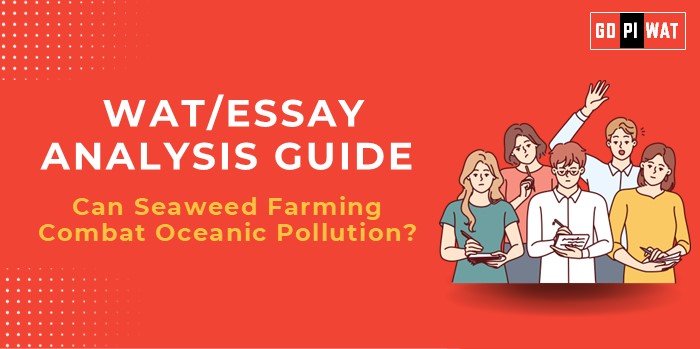📋 WAT/Essay Analysis Guide: Can Seaweed Farming Combat Oceanic Pollution?
🌍 Understanding the Topic’s Importance
Seaweed farming bridges the environmental and economic domains, providing a tangible solution to oceanic pollution while addressing sustainable development goals.
⏳ Effective Planning and Writing
- 🧠 Time Allocation:
- Planning: 5 minutes
- Writing: 20 minutes
- Review: 5 minutes
- 📋 Preparation Tips:
- Focus on credible data, such as pollution statistics and successful case studies, to substantiate claims.
💡 Introduction Techniques for Essays
- 🌊 Contrast-Based Introduction:
“Despite producing 80% of the world’s oxygen, our oceans face the dire threat of pollution. Could seaweed farming be the silver bullet we need?” - 🚀 Solution-Oriented Introduction:
“As plastics choke our oceans, seaweed farming emerges as an innovative method to clean waters and empower communities.”
📚 Structuring the Essay Body
- 🏆 Achievements:
- Highlight data on nutrient absorption, carbon sequestration, and bioplastic alternatives.
- ⚖️ Challenges with Comparative Analysis:
- Discuss ecological and logistical challenges with examples from successful nations like South Korea and emerging regions like India.
- 🚀 Future Outlook:
- Propose innovative techniques and policies to scale seaweed farming responsibly.
🎯 Concluding Effectively
- ⚖️ Balanced Conclusion:
“Seaweed farming presents an optimistic but cautious approach to combating ocean pollution. Its success hinges on addressing ecological concerns and ensuring global collaboration.” - 🌏 Future-Focused Conclusion:
“Seaweed farming, a nature-based solution, can lead global efforts to protect marine ecosystems if supported by technological and policy advancements.”
🔍 Analyzing Successes and Shortcomings
- ✨ Achievements: Eco-friendly nutrient absorption, carbon offset potential, emerging market opportunities.
- ⚠️ Ongoing Challenges: Limited scalability, economic barriers, and ecological implications.
- 🌏 Global Context: South Korea and Norway provide leading models; India offers emerging success stories.
🛠️ Recommendations for Sustainable Progress
- 🤝 Promote Public-Private Partnerships: Foster collaboration for research and development.
- 🌿 Implement Diversified Farming Practices: Prevent monoculture impacts on ecosystems.
- 💰 Subsidize Initial Investments: Support farmers and create accessible markets for seaweed products.
✍️ Sample Short Essays on the Topic
- ⚖️ Balanced Perspective:
“Seaweed farming combats oceanic pollution by absorbing harmful nutrients and sequestering carbon, but global implementation must address ecological risks.” - 💡 Solution-Oriented Approach:
“As oceans suffer from nutrient overload and plastics, seaweed farming offers a dual solution: ecological restoration and biodegradable materials.” - 🌏 Global Comparison:
“South Korea’s seaweed industry exemplifies how sustainable aquaculture can address pollution while boosting local economies, a model for global emulation.”


